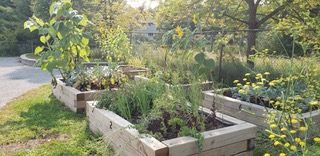Farm to Cafeteria Canada Grant Story: Heritage Public School
Posted: July 7, 2021
Categories: Edible Education Network / Good Food Ideas for Kids / School Food News / Schools
 Heritage Public School in Navan, Ontario (a part of the Ottawa-Carleton District School Board), has recently shared a farm to school grant story on the Farm to Cafeteria Canada blog, detailing how they found some exciting ways to put farm to school in action through a challenging year.
Heritage Public School in Navan, Ontario (a part of the Ottawa-Carleton District School Board), has recently shared a farm to school grant story on the Farm to Cafeteria Canada blog, detailing how they found some exciting ways to put farm to school in action through a challenging year.
“When we received our F2S Grant in October 2020,” their story shares, “Heritage Public School’s staff, students and local community were elated at the idea of bringing fresh, local foods and food literacy programming into the classroom.” Plans for their first grant year (2020-2021) included a garden expansion, self-serve salad bar days, visits to local farms, hands-on growing and cooking experiences, and much more.
Unfortunately, restrictions due to the ongoing pandemic changed a lot of those plans. But their blog post shares how the farm to school spirit carried on through the following: a Tower Garden Installation, Raising Chicks & Ducklings, Virtual Farm Sessions, Fall Harvesting of Raised Garden Beds, F2S-themed Fundraisers, Student-led Farm Learning from Home, Outdoor Learning, and Pollinator Education.
As one example, a local grain farmer and community partner, Shelley Spruit of Against the Grain Farms, hosted a series of virtual workshops that were a big hit with the students. The school also partnered with Against the Grain Farms for a fundraiser in December that offered local grains and pancake mixes with recipes.
Fortunately, they were also able to find some time for hands-on growing and harvesting between lockdowns.
“While Covid-19 brought many twists to our F2S plans, we did our best to explore alternatives, connecting with farms and community to support local agriculture, food literacy and nurture students’ respect for nature.”
